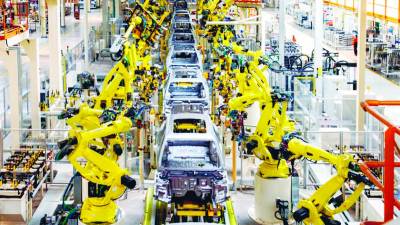MODERN offices are increasingly dominated by software systems, robots and AI-powered devices while traditional tellers are becoming less necessary as banks rely more on chatbots and digital platforms, replacing manual workers.
There is no doubt that advanced technology, particularly AI, has revolutionised business operations in Malaysia, offering cost savings, efficient resource use and a competitive advantage. However, the question remains whether social sustainability is being neglected.
From an environmental and economic perspective, digitalisation has proven to be a powerful ally for sustainability. Businesses that adopt AI and automation often see dramatic cost savings. For example, retailers, logistics and plantation companies now use predictive analytics, AI, drones and sensors to optimise inventory management, reduce waste and boost crop monitoring. These changes not only reduce expenses but also contribute to resource efficiency, aligning with Malaysia’s commitments to the United Nations’ Sustainable Development Goals (SDG).
Moreover, companies that integrate technology will gain a competitive edge in global supply chains, where sustainability credentials increasingly determine market access. For many business leaders, this is a win-win situation with lower costs, greener operations and stronger competitiveness. But sustainability rests on three pillars: environmental, economic and social. The cracks, however, are starting to show on the social front.
The use of automation and AI often leads to a reduction in the number of workers needed in traditional roles. In Malaysia, this is not a distant threat as it is already happening.
Malaysia’s manufacturing sector, which employs 27.5% of the workforce, is at risk of automation, potentially reducing job opportunities and increasing job insecurity for workers, especially in electronics assembly plants and furniture factories.
Similarly, the banking sector has experienced a steady increase in branch closures over the past five years, driven by mobile banking apps and AI-powered chatbots, causing redundancy for tellers and support staff.
Even in agriculture, where Malaysia is investing in smart farming to boost food security, the story is mixed. While drones and sensors help paddy farmers optimise yields in Kedah, they also reduce the need for manual workers.
The fear among rural communities is that technology may hollow out traditional livelihoods if reskilling is not part of the equation.
When workers lose jobs without alternative opportunities, the principle of social sustainability, including ensuring fairness, inclusivity and community well-being, is undermined.
Unemployment can create ripple effects – families struggle financially, inequality widens and communities lose resilience.
In Malaysia, where SMEs employ nearly half of the workforce, the stakes are high. If small businesses adopt technology without thinking of human impact, the consequences will be felt not just in balance sheets but in households across the nation.
Moreover, digitalisation risks creating a two-tier workforce. High-skilled workers – for example, data scientists, engineers, IT specialists – will thrive while lower-skilled workers may find themselves excluded. Unless reskilling and education catch up, Malaysia risks deepening socioeconomic divides, making the digital economy less inclusive.
Tech efficiency, social inclusion
The good news is that this is not a zero-sum game. Malaysia can pursue technology-driven business models without abandoning social sustainability. But this requires deliberate policies, forward-thinking leadership and inclusive practices.
For example, workers displaced by automation must be supported with training. The government’s initiatives such as the HRD Corp’s reskilling programmes are a good start. However, uptake among SMEs remains low. Companies must view reskilling as a long-term workforce investment, not just a charitable act.
In addition, companies must adopt technology responsibly. The goal should not just be to cut cost but also to find ways for machines to complement people. For example, AI can take over repetitive tasks, freeing employees for roles that require creativity, empathy and complex decision-making.
Inclusive business models are also helpful as they ensure technology benefits the broader ecosystem, not just large companies.
By sharing digital tools, offering training and technical support with SMEs and cooperatives, large companies can help smaller players modernise at lower costs.
For rural entrepreneurs, such partnerships can open national and even global markets, enabling them to boost incomes while preserving traditional skills.
In Malaysia, for example, Shopee’s “Made in Malaysia” and Lazada’s SME programmes have enabled thousands of small sellers to expand online.
At the same time, Petronas engages local SMEs in its supply chain, providing them with digital capabilities and market access. Such models not only diversify supply chains and enhance ESG credentials but also turn digitalisation into a driver of shared prosperity, making the economy more inclusive and resilient.
Sustainability reporting can also help to balance tech efficiency with social inclusion by making companies disclose how automation impacts jobs, skills and communities.
Transparency pushes companies to pair efficiency gains with reskilling and fair practices, ensuring technology creates shared value. This will build trust, protect livelihoods and support Malaysia’s long-term sustainable growth.
Balancing efficiency with equity
Malaysia’s push to become a high-income digital economy by 2030 carries opportunities and risks. To succeed, the nation must balance technological competitiveness with social inclusion, ensuring workers and communities are not left behind.
The palm oil industry offers a glimpse of this balance, where companies use AI to monitor deforestation while reskilling employees as drone operators and data analysts. Such initiatives show how technology and human development can advance together.
Education is equally vital. Schools and universities must equip students not only for today’s roles but also for jobs that have yet to emerge. By emphasising digital literacy, sustainability and entrepreneurship, Malaysia can build a resilient workforce prepared for disruptions.
In the end, true sustainability lies in ensuring efficiency does not come at the cost of equity. The real test is whether technology serves people or whether people end up serving technology.
Dr Dalilawati Zainal is a senior lecturer at the Department of Accounting, Faculty of Business and Economics, Universiti Malaya. Comments: letters@thesundaily.com
